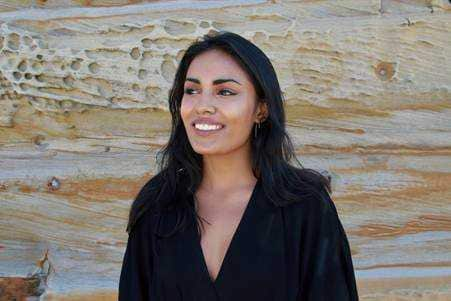Pale surf swells up over the shore, drawing sand, stones and the amorphous blob of a jellyfish away with it. Gulls fly past. A toddler’s unattended ice-cream scoop slides off its cone and plops onto the boardwalk. Browning bodies lie turned to the sun. It is most definitely summer on the north coast of New South Wales.
Cut to me: seventeen, wearing an enormous hat and a linen shirt in what I thought was a jaunty Brigitte-Bardot-in-St-Barthes way, and contemplating how I could justify not getting in the water that day because it would mean dismantling my meticulously layered sun-armour. You see, brown skinned girls in many parts of the world grow up with the knowledge, accumulated on many conscious and subconscious levels, that that the whiter they are, the more valuable they are.
My brown skin felt too dark. And God forbid it got any darker.
Since I can remember, going to the beach has been a battleground between what I know to be true and the undercurrents of a colonialist, outmoded logic which still have a loosening, but present, grasp on how I conceive of beauty.
My brown skin felt too dark. And God forbid it got any darker.
What I know to be true: at best, the shade of my skin is irrelevant, and at worst, thinking about it actively takes my attention from other more useful things, aka anything. The pesky undercurrent: lighter skin is more beautiful, and I will be better for being whiter.
I always loved summer’s waves, the water, the wet togs drying on the backyard hills hoist. When we moved from the beach, summer was spent by the local pool and smelled like chlorine and honeysuckle flowers you eat the straw ends of. But there was also a sense that it wasn’t as carefree for me as it was for the other kids. I was slathered in sunscreen which left a blue-white sheen and checked my body for tan lines when I returned. Not triumphant, but watchful.
Of course, this was positive in the sense that sun safety is crucial. The effects of the sun on skin, black or brown or white, cannot be understated in Australia’s perilous UV levels. People with dark skin are not immune to skin cancer, and when they are diagnosed with it, it’s often at a later stage of the disease according to this study.
The history of privileging fair skin is complicated, but undeniably political. In India, the politics of caste is intertwined with skin colour, where lower castes are aligned with darker skin and accordingly oppressed
I was told to stay out of the sun my whole life. Relatives would sigh when I went back to visit India for the holidays. “Getting so dark, kuttima.” I was told I was pretty even though I was dark. That it was lucky I lived in Australia, because Indian men want someone fairer. The history of privileging fair skin is complicated, but undeniably political. In India, the politics of caste is intertwined with skin colour, where lower castes are aligned with darker skin and accordingly oppressed. In the love story at the centre of Arundhati Roy’s novel The God of Small Things, an upper-caste woman in Kerala forges a romance by night with a local “untouchable” labourer. He is given his name Velutha, “which means white in Malayalam, because he was so black”. The colour of his skin, which glistens in the moonlight makes even clearer the transgressive nature of their love. Caste, class and socio-economic differences are the chasms widened by the idea that dark skin is inferior.
The history of privileging fair skin is complicated, but undeniably political. In India, the politics of caste is intertwined with skin colour, where lower castes are aligned with darker skin and accordingly oppressed. In the love story at the centre of Arundhati Roy’s novel The God of Small Things, an upper-caste woman in Kerala forges a romance by night with a local “untouchable” labourer. He is given his name Velutha, “which means white in Malayalam, because he was so black”. The colour of his skin, which glistens in the moonlight makes even clearer the transgressive nature of their love. Caste, class and socio-economic differences are the chasms widened by the idea that dark skin is inferior.

Divya Venkataraman reflects on her relationship with the sun. Source: Supplied
Once, a girl in high school held her arm up to mine at the beach: “I wish I was as tanned as you!” I remember thinking, this is just brownness. Not a tan
The battlelines of this conversation are blurred and move between the personal— the nagging aunties— to the political— the multi-billion-dollar skin whitening industry profiting off (mostly) feminine insecurity. The paradoxes contained within them are inherent in life as a between-places child.
Once, a girl in high school held her arm up to mine at the beach: “I wish I was as tanned as you!” I remember thinking, this is just brownness. Not a tan. Just year-round brown. Like those trees that don’t lose their leaves. Not deciduous.
You only wish because you have the privilege to wish. Because you weren’t told to hide from the potent, mystical energy of the sun. Sunscreen applied every two hours, of course. You were allowed to take it in.
But now, I’ll take it in too. It is up to me to quieten those voices which push up against what I know to be true. What a relief to turn my face to the sun and listen to the ocean instead instead. Shine on.
Divya Venkataraman is a freelance writer and editor. You can follow her on Twitter at @divyavenktrmn.
Celebrate diversity and the International Day for the Elimination of Racial Discrimination with a collection of documentaries exploring racial discrimination and inclusion from around the world on SBS On Demand.


